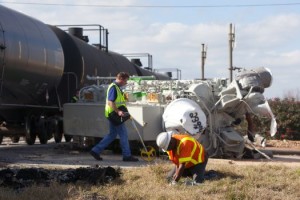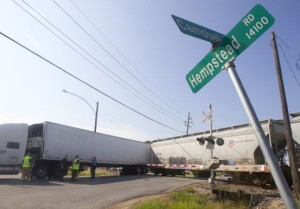Parras: Trains carrying oil an accident waiting to happen: Officials should back federal efforts to strengthen crude transport safety
By Juan Parras | Houston Chronicle | March 27, 2015 | bit.ly/1BWIv2U

Crews work to clean up a wreck after an 18-wheeler collided with a train at the HWY 290 frontage road and Tegle Road Friday, Jan. 25, 2013, in Cypress, TX. (Cody Duty / Houston Chronicle)
It’s no secret that Houston is an oil-train derailment waiting to happen and that people would be killed in the disaster, possibly dozens or even hundreds of them.
In the most recent of many derailments of trains carrying highly flammable Bakken oil, 21 cars went off the tracks near Galena, Ill. The disaster sent fireballs into the air and caused a blaze that lasted for days. No one was killed or wounded; it happened in a wooded area outside of town.
In Houston, we would never be so lucky.
Sixty-six to 200 Bakken oil train cars go through our city every week – about 3,500 to more than 10,000 every year, according to Texas Department of Public Safety. The rail lines that carry them run from northwest Houston right through downtown and then split into multiple tracks in the East End before reaching the Houston Ship Channel and refinery district.
Living in Houston is like sitting on top of an oil-train time-bomb, and all it takes is a drive along the freight-train tracks to see that.
Downtown, the tracks run by family courts, the county jail, the District Attorney’s Office, juvenile court, and the University of Houston-Downtown campus, not to mention the high-rise buildings that employ thousands of people. When an oil train derailed in the town of Lac-Mégantic, Quebec, 47 people were killed. How many would die if there were a derailment on a weekday in downtown Houston when the streets are crowded with students, families and workers?
Going east from downtown, the freight train tracks pass through Midtown, Eastwood, the Navigation/Jensen area and the Third Ward with its huge complex of Section 8 housing. The tracks pass condos off of Navigation and Canal, the soccer stadium, the baseball stadium and then move into the Second Ward, Magnolia and finally on to the Manchester community. In all of these areas, the tracks cross major streets multiple times. The tracks border people’s backyards, pass within 100 feet, even 50 feet of schools, churches, community centers and playgrounds. If the Galena derailment happened in the East End, the fiery fallout would rain down on people’s houses.
In 2013 and 2014, there were eight oil train derailments that caused major fires, dumped oil into waterways and spread charred metal across fields, according to a December, 2014 study U.S. Congressional research service study. This year’s oil-train derailments – in Galena and in Mount Carbon, Va. – add two more to the list. No wonder even the U.S. Department of Transportation admits to being worried about a derailment in a city like ours. In a report released last year, the department predicted there would be an average 10 derailments of trains carrying ethanol or oil every year and that if they happen in urban areas, hundreds could be killed. The report also predicted that economic losses could reach more than $4 billion.
Houston needs to act now to put pressure on the famously powerful railroads.
At minimum, Houston should enforce the restrictions on how long trains can sit idle on tracks so that they are not as vulnerable to attack. Elected officials and the public should demand the information that will help communities and first responders protect themselves. Specifically, railroads should provide their “worst-case scenarios,” since those would provide information about the potential scope of oil train derailments in urban areas. The railroads should also provide the details of their catastrophic insurance, so we know whether they can pay for billion-dollar cleanups. Other cities and states are demanding that railroads loosen their grip on this information. Since Houston easily is among cities most at risk for an oil train derailment, we should join the chorus.

Officials work the scene of a wreck after a train collided with an 18-wheeler at the intersection of Campbell Road and Hempstead Road Monday, Aug. 6, 2012, in Houston. The train hit the truck after the truck ran the gate and stopped in a short stage crossing with his trailer overhanging the tracks officials said. Officials issued the driver a violation of inspection for being on the tracks. (Cody Duty / Houston Chronicle)Officials work the scene of a wreck after a train collided with an 18-wheeler at the intersection of Campbell Road and Hempstead Road Monday, Aug. 6, 2012, in Houston. The train hit the truck after the truck ran the gate and stopped in a short stage crossing with his trailer overhanging the tracks officials said. Officials issued the driver a violation of inspection for being on the tracks. (Cody Duty / Houston Chronicle)
As a state, we should follow the lead of others states with heavy oil-train shipment. Our elected officials should support federal efforts to tighten safety standards for oil trains. For example, federal legislation introduced last week would require rail cars to be protected by more puncture-resistant steel shells and thermal jackets that increase fire resistance as well as mandate an immediate halt to transportation of oil in rail cars that haven’t been reinforced. The bill would require more safety inspections of rail carriers and oil producers, heftier penalties for noncompliance, improved spill response plans, and mandate that state and local authorities be notified before oil trains move through their communities.
Our elected officials are securing millions of dollars to dredge the Ship Channel so it can handle more traffic once the Port of Houston expands. They should also be securing money to protect the communities that will bear the risks of expansion. By 2025, freight traffic in Houston is expected to nearly double, according to a study contracted by the Texas Department of Transportation.
The railroads are powerful forces notoriously resistant to pressure, but our elected officials must use whatever state and city regulations are available to minimize if not eliminate the risk they pose to our communities.
Juan Parras, director of Texas Environmental Advocacy Services (T.E.J.A.S.), is a resident of the East End and has worked on environmental justice issues in Houston for more than 20 years.



